Bring Back More Magic[al Girls]
by Rebecca Silverman,It's a pretty good time to be a fan of magical girls. Not that there's ever been a truly bad time for it, but it's hard not to notice that as I write this we've got two classically-framed (as in, for an intended audience of children) shows legally streaming and a reboot of a third on the way, and RetroCrush has brought over three of Studio Pierrot's magical girl shows from the 1980s: Creamy Mami, Magical Emi, and Pastel Yumi.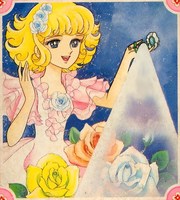 We're on our third legal simultaneous stream of a currently airing Pretty Cure title and our first for a Pretty Rhythm series, both of which are exciting, because traditionally we haven't seen much in the way of children's franchises picked up for this sort of thing, and especially not ones intended for girls. Whether we can thank Sailor Moon Crystal for this, as streaming services hoped to attract more viewers looking for something similar, or if it's just luck almost doesn't matter, because it's simply a thrill to have them available.
We're on our third legal simultaneous stream of a currently airing Pretty Cure title and our first for a Pretty Rhythm series, both of which are exciting, because traditionally we haven't seen much in the way of children's franchises picked up for this sort of thing, and especially not ones intended for girls. Whether we can thank Sailor Moon Crystal for this, as streaming services hoped to attract more viewers looking for something similar, or if it's just luck almost doesn't matter, because it's simply a thrill to have them available.
And now with Tokyo Mew Mew's reboot ready to go, it seems like a good time to think about what other magical girl shows might be ripe for a reboot or an official English license, either streaming or on disc. As a note, I'm going to leave out the missing PreCure seasons because frankly we all know which ones ought to be licensed next and I'm hoping that it's only a matter of time before they are, and that also goes for the missing early Pierrot magical girl series, Magical Fairy Persia. And with that disclaimer out of the way…
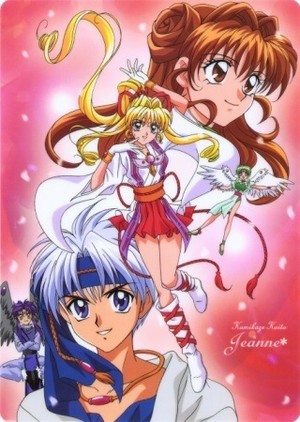 Arina Tanemura's first full-length magical girl series, a genre she's worked in a lot, ran in Ribon from 1998 – 2000, totaling seven volumes in the original tankobon release. It's had several re-releases, an artbook, four light novels, and Tanemura herself published two doujinshi in the series in 2014. So even without factoring in the forty-four-episode anime that aired between 1999 and 2000, this is already a series that's got the chops to get a reboot. Add in that the anime ended six months before the manga concluded and you've got another good argument for rebooting the franchise: a more faithful adaptation.
Arina Tanemura's first full-length magical girl series, a genre she's worked in a lot, ran in Ribon from 1998 – 2000, totaling seven volumes in the original tankobon release. It's had several re-releases, an artbook, four light novels, and Tanemura herself published two doujinshi in the series in 2014. So even without factoring in the forty-four-episode anime that aired between 1999 and 2000, this is already a series that's got the chops to get a reboot. Add in that the anime ended six months before the manga concluded and you've got another good argument for rebooting the franchise: a more faithful adaptation. While the original anime series isn't terrible, it also isn't quite as true to the manga as it could be, both in deviating from Tanemura's plot entirely in places, but also in how it was taken down a few notches in terms of the darkness of the story. These darker elements are integral to the story's overall theme about how no one can devalue you – you are the ultimate arbiter of your own worth. That's not a theme that becomes irrelevant over time, and if anything, it's one that bears repeating, something magical girl series are in a very good position to do. Maron, Phantom Thief Jeanne's heroine, is essentially abandoned by her parents, and her bond with the angel Finn Fish gives her both someone to care for and receive care from, as well as a purpose by giving her the power to transform into the eponymous phantom thief. (Plus a plot twist that predates Puella Magi Madoka Magica's use of the same and almost certainly influenced it.) Maron's story involves Jeanne d'Arc, as the title suggests, and while it perhaps isn't any more accurate than any other anime usage of the character, it is well done in terms of how Maron learns to believe in herself and to see beyond the cult of female “purity.” The series also has a strong magical boy character in Chiaki/Phantom Thief Sinbad, who is both Maron's rival and love interest in a way that gives him as much of a stake in their relationship as she has, if not more – he's no Tuxedo Mask, chucking a rose and saying something cryptically encouraging, and we're seeing that kind of character become more common with Takumi in Delicious Party Pretty Cure and Touma and Hughie in Waccha PriMagi. Why not bring back this series and add another to the roster?
Finally, while the 1999-2000 anime series did its best to incorporate CG techniques and other technological advances that were just starting to be used, it didn't look all that great. Arina Tanemura's art style, with its curves, whiplash lines, and intricate details, sets a high barrier to animation, but it could absolutely be done to look more like her original art. An artistically-faithful Phantom Thief Jeanne would just be the icing on the cake of a story-faithful reboot. I'd love to see it happen.
 Based on a four-volume manga by koi ikeno that ran in Ribon between 1995-96, the series was adapted into a thirty-five-episode anime in those same years, beginning six months after the manga began serialization and ending a few months before the manga wrapped up. While that does mean that it features some padding of the plot and anime-only characters, what's more important is what makes this series stand out from the crowd. Mostly that's the fact that Ririka is a magical girl team of one – while Kanou-sempai, the person who grants her her transformation, and her friend Seiya do have some powers that they use to help her out, Ririka bears the brunt of the job of saving the Earth from Dark Joker and finding the Flower of Life, a plant integral to their defeat. This gives her much more power than magical girls who are part of teams, and also a lot more responsibility: if Ririka uses up her supply of green vaccine or falls in battle, it's all over for both Earth and the planet Queen Earth, the mostly-decimated world Kanou came from. She is the last line of defense.
Based on a four-volume manga by koi ikeno that ran in Ribon between 1995-96, the series was adapted into a thirty-five-episode anime in those same years, beginning six months after the manga began serialization and ending a few months before the manga wrapped up. While that does mean that it features some padding of the plot and anime-only characters, what's more important is what makes this series stand out from the crowd. Mostly that's the fact that Ririka is a magical girl team of one – while Kanou-sempai, the person who grants her her transformation, and her friend Seiya do have some powers that they use to help her out, Ririka bears the brunt of the job of saving the Earth from Dark Joker and finding the Flower of Life, a plant integral to their defeat. This gives her much more power than magical girls who are part of teams, and also a lot more responsibility: if Ririka uses up her supply of green vaccine or falls in battle, it's all over for both Earth and the planet Queen Earth, the mostly-decimated world Kanou came from. She is the last line of defense.As you might expect, this gives Nurse Angel Ririka SOS a grimmer edge than many of its contemporaries, and without the gut-wrenching anime ending, I don't think later dark magical girl titles could have taken form the way they did, or even some aspects of Healin' Good Pretty Cure. Ririka embodies the idea of giving your all for what you believe in without the reassurance of Sailor Moon (whose manga predates her own) that an eternal cycle of rebirth will save her, and the maturity she gains over the course of the series feels natural as she learns both how to be a magical girl and more about the situation she's in. Ririka has to think, not just go with her gut, and her choices carry real weight. When we pair that with the unusual makeup of her team, it really helps her to stand out.
The character designs are very typical of Ribon titles of its age, and the animation isn't spectacular. (The music, on the other hand, is – both opening theme songs are very good.) But the story is impressive and sets the stage for a lot of the magical girls who followed after, and we're also in a place right now where a nurse angel might just be the kind of hero we need. This series has a lot to offer, and someone ought to pick it up.
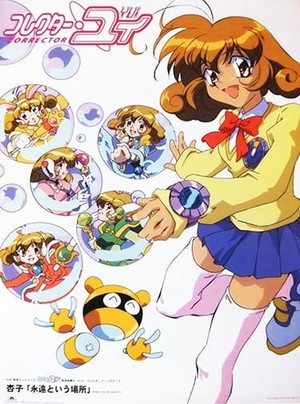 Originating with a two-volume manga series in Ciao by Kia Asamiya in 1999, there's also a nine-volume, more classically shoujo manga version by Keiko Okamoto that Tokyopop released in English from around the same time and a two-season anime that Viz partially released; the full series aired between 1999 and 2000 and has fifty-two episodes. So again, this is a franchise with a fairly impressive background, made even more so by the at times tenuous link to the classic novel Hakkenden. But the real reason why this deserves to be redone is that technology and tastes have caught up with Yui and her VR friends, giving the story the potential to have much more impact if recreated with today's standards.
Originating with a two-volume manga series in Ciao by Kia Asamiya in 1999, there's also a nine-volume, more classically shoujo manga version by Keiko Okamoto that Tokyopop released in English from around the same time and a two-season anime that Viz partially released; the full series aired between 1999 and 2000 and has fifty-two episodes. So again, this is a franchise with a fairly impressive background, made even more so by the at times tenuous link to the classic novel Hakkenden. But the real reason why this deserves to be redone is that technology and tastes have caught up with Yui and her VR friends, giving the story the potential to have much more impact if recreated with today's standards.The basic plot of the story is that the internet, in the no longer far-off days of 2020, is primarily VR-based. Professor Inukai is one of the premier programmers and developers of the software that manages it, but when one of his A.I., Grosser, slips from his control, he needs help “correcting” the problem. Enter Yui, a typical fourteen-year-old girl of the time (which is to say clumsy and not academically gifted), who is selected by a program to become a Corrector, joining eight A. I. in the depths of the web to fight Grosser with the amazing powers of virus protection and other similar weapons. For its time, Corrector Yui really does make the most of what it's got, and there are some very good character beats that hold up even now, most notably the plotline with Yui's friend Haruna, who was supposed to be the Corrector but was sidelined and then corrupted by Grosser. Yui's mission of saving her friend is thus complicated by Haruna dealing with her feelings about Yui stealing what was supposed to be her role. These are key moments that show what this series has to offer, and while we aren't living in a VR wonderland despite it being 2022, the way that we use the internet, and more specifically the rise of social media and teens tying their self-worth to it, mean that Haruna's storyline could be greatly enhanced and expanded to be very relevant today.
There's also the added benefit of the isekai craze. While Corrector Yui doesn't really fall under that heading, it does check a lot of the boxes that might help it to appeal to fans of that genre. Yui doesn't just transform – she enters another world to fight, drawing parallels with any series set in a VR game that remains an immersive game (Instead of turning into a real world based on a game). That Yui is fighting to protect that otherworld can also give off some Infinite Dendrogram vibes, as well as a few nods to SAO, where the virtual and real worlds impact each other. Isekai's enhancement of the “chosen one” trope could also come in handy here, because Corrector Yui relies so heavily on the idea of it in a way that isn't necessarily present in most magical girl stories. If redone, this is a series that could have a lot of crossover appeal for those who aren't necessarily into magical girls, and on the whole, of all of the series whose time has come, this may be the one most ripe for a reworking.
 The original manga, written by Min Ayahana and serialized in Ribon between 1992 and 2000 (with a spin-off series in Cookie running from 2012 – 2019), is strictly a fairytale-inspired comedy about the adventures of an inept young witch named Cha-Cha with her friends Riiya the werewolf and Shiine, a much more skilled young magic user. The magical girl aspect was shoehorned into the story when the series was adapted into a seventy-four-episode anime series airing in 1994-95, largely because of the popularity of Sailor Moon. And yeah, the magical girl component really doesn't add anything to the story – even if you didn't know for certain that it was thrown in to ensure the anime's popularity with the kiddies, you could make a very good guess that that's precisely what happened. So then why include the series in this piece?
The original manga, written by Min Ayahana and serialized in Ribon between 1992 and 2000 (with a spin-off series in Cookie running from 2012 – 2019), is strictly a fairytale-inspired comedy about the adventures of an inept young witch named Cha-Cha with her friends Riiya the werewolf and Shiine, a much more skilled young magic user. The magical girl aspect was shoehorned into the story when the series was adapted into a seventy-four-episode anime series airing in 1994-95, largely because of the popularity of Sailor Moon. And yeah, the magical girl component really doesn't add anything to the story – even if you didn't know for certain that it was thrown in to ensure the anime's popularity with the kiddies, you could make a very good guess that that's precisely what happened. So then why include the series in this piece? Because it's really, really funny. The humor of Akazukin Cha-Cha works on several levels, at least one of which is attributable to an excellent vocal cast in the original Japanese. (I can't speak to dubs in other languages, unfortunately.) Chief among the performances is Taiki Matsuno (no stranger to magical girl shows; he's also Helios/Pegasus in Sailor Moon SuperS and Tart in Fresh Pretty Cure) as Rascal-sensei, Cha-Cha's whip-wielding lunatic of a teacher, but Shingo Katori also has some great delivery as Riiya, as does Masami Suzuki as Cha-Cha. Since a lot of the humor relies on Cha-Cha making a mistake in her spellcasting, often with homonyms, her reaction sounds are important, and Suzuki does a very nice job with it. Most of the homonym gags hold up well even if you don't know the words Cha-Cha is confusing, too, largely because expecting a cloud and getting spiders (both “kumo”) is always going to get a reaction from the audience. This kind of humor also doesn't really feel dated; neither do the fairy tales that form the basis of the story in the first place. Cha-Cha is quite obviously Little Red Riding Hood with Riiya as her Big Bad Wolf and Shiine as her (potential) Prince Charming, and we also have a Little Mermaid, a few other Red Riding Hood riffs, and Dorothy as the Wicked Witch. Since these characters are no less well-known today than in the 90s, this helps to give the series a slightly timeless feel and a sense of accessibility, and certainly the familiarity of the basic fantasy tropes also used as a base for the characters and plot helps with that as well. 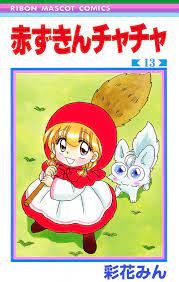 Plus there's the Nyandaber mech and the Neko House Cha-Cha acquires later in the show. I can't overstate how amazing the Neko House is.
Plus there's the Nyandaber mech and the Neko House Cha-Cha acquires later in the show. I can't overstate how amazing the Neko House is.
Now, there is one joke that is very much not okay by today's standards and thus might be a dealbreaker – Shiine's master, Dorothy, has a younger sister named Doris who is trans, and Seravy (Cha-Cha's master)'s fear of her can be construed as transphobic. On the other hand, Doris kidnaps Dorothy in a bid to trick Seravy into thinking that she's Dorothy and hits Riiya with her car, so it's less an issue of her transness and more that she's actually a terrible person; it's the framing that's at least part of the problem. Doris also appears in very few (possibly only one) episodes, so while I'm not a fan of censorship, it could simply be left out of a release, or prefaced with a content note. And there's so much that Akazukin Cha-Cha does well that it really does deserve a chance at a legal release, because even with a lacking magical girl plot, it's a very funny show about a magic-using girl and her goofy friends.
 It has to be said that that's a rather unique magical girl concept, and certainly one that could benefit from a more modern reworking. Pigs often get a bad rap, and Karin's far from thrilled with her transformation, but both of those could be levered into a story about misconceptions and learning to appreciate things you didn't think you could. Certainly Ranma ½ showed us that turning into a pig isn't all bad, and Karin's story has the potential to do more than just be a series of cute pig gags, especially if some of the more judgmental qualities inherent in a story from the mid-90s about a girl turning into a pig were filtered out. There's also an interesting karma aspect, wherein Karin has to collect 108 karmic pearls, which could take on a new form in today's world. Perhaps most importantly in terms of rebooting, unlike Nurse Angel Ririka SOS, the original Tonde Burin doesn't use most of its stretched episode count to further a main plot, and it feels kind of bloated. A new adaptation could fix that, focusing on the plot and the unique aspects of a magical girl who transforms into a full-on animal to create a more faithful, more concise version of Ikeda's manga.
It has to be said that that's a rather unique magical girl concept, and certainly one that could benefit from a more modern reworking. Pigs often get a bad rap, and Karin's far from thrilled with her transformation, but both of those could be levered into a story about misconceptions and learning to appreciate things you didn't think you could. Certainly Ranma ½ showed us that turning into a pig isn't all bad, and Karin's story has the potential to do more than just be a series of cute pig gags, especially if some of the more judgmental qualities inherent in a story from the mid-90s about a girl turning into a pig were filtered out. There's also an interesting karma aspect, wherein Karin has to collect 108 karmic pearls, which could take on a new form in today's world. Perhaps most importantly in terms of rebooting, unlike Nurse Angel Ririka SOS, the original Tonde Burin doesn't use most of its stretched episode count to further a main plot, and it feels kind of bloated. A new adaptation could fix that, focusing on the plot and the unique aspects of a magical girl who transforms into a full-on animal to create a more faithful, more concise version of Ikeda's manga.
Perhaps there isn't as much to say about this one as some of the other titles that deserve to be brought back into the light of day. But even if it wasn't unique in its transforming heroine, it's still got a lot of appeal if done right, and you need look no further than Ben Brashares and Elizabeth Bergelande's picture book Being Edie is Hard Today to know why: sometimes the transformation we desire isn't into a fancier form of ourselves, but into something else entirely. I know I've tried to project armadillo but, like Edie, felt more like a naked mole rat, and a well-done reboot of Tonde Burin could address that along with its other charms.
 She gets the chance to challenge that idea of herself when she meets Erika, the princess of a magical kingdom who gives her a special ribbon. When Hime-chan puts it on and recites the magic spell, she's able to transform into anyone on Earth for an hour. But it comes with a catch: if Hime-chan doesn't deliberately de-transform before the time is up, she'll be stuck in her transformed state forever. Equally alarming is the caveat that if she mentions Erika or her kingdom to anyone, she'll have her memory erased for good.
She gets the chance to challenge that idea of herself when she meets Erika, the princess of a magical kingdom who gives her a special ribbon. When Hime-chan puts it on and recites the magic spell, she's able to transform into anyone on Earth for an hour. But it comes with a catch: if Hime-chan doesn't deliberately de-transform before the time is up, she'll be stuck in her transformed state forever. Equally alarming is the caveat that if she mentions Erika or her kingdom to anyone, she'll have her memory erased for good. These stakes may be strictly personal and involve the use of magic, but they're also much more grounded in reality than many other magical girl tales, and more than that, they're indicative of anxieties that simply don't get outdated. While the look of the series is very much of its time (the anime dates to 1992-93), the fear of growing up and no longer being yourself remains, and perhaps is even more relevant with current social media trends, although I'd argue that it's not so much “more relevant” as “getting more media attention.” This universality of theme and Hime-chan's very relatable fears of somehow being lacking when she's her regular self make a strong case for the show, and the fact that it comes with several expiration dates for her – along with the one hour time limit, she only gets the use of the magic ribbon for one year – add to the sense of urgency that Hime-chan feels about whether or not she's truly the person she ought to be. Questions of “want to be” and “supposed to be” are present throughout the story, and while there are also plenty of light-hearted moments, this just feels much more real than even other works in the subgenre it's part of, that of magical girls who simply alter their appearances.
It's worth mentioning that this would also work very well as a reboot, and not just because there's been a pretty substantial decrease in ribbon-wearing. 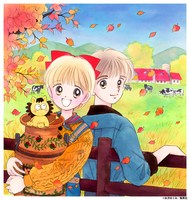 Some more modern trappings and possibly updated character designs (because while I love Mizusawa's storytelling, her art's just kind of blah) might enhance the plot for modern viewers, and while the original doesn't feel too stretched-out (it does have substantially more volumes of source manga than many other titles on this list), it could probably benefit from a bit of plot-tightening. But whether it's a license or a reboot, Hime-chan's Ribbon is a magical girl title that deserves to be revisited as a quieter, but no less engaging, classic series.
Some more modern trappings and possibly updated character designs (because while I love Mizusawa's storytelling, her art's just kind of blah) might enhance the plot for modern viewers, and while the original doesn't feel too stretched-out (it does have substantially more volumes of source manga than many other titles on this list), it could probably benefit from a bit of plot-tightening. But whether it's a license or a reboot, Hime-chan's Ribbon is a magical girl title that deserves to be revisited as a quieter, but no less engaging, classic series.

discuss this in the forum (53 posts) |